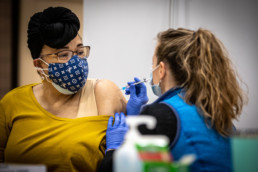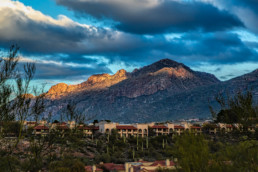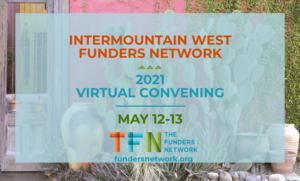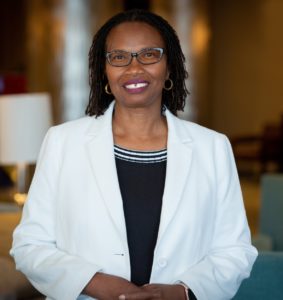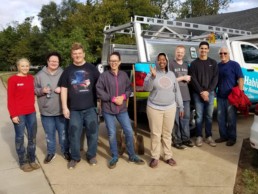American Rescue Plan: Join TFN's Inclusive Economies webinar to learn how funders can help communities leverage federal dollars
By TFN Staff
Communities across the U.S. are poised for an unprecedented infusion of direct and programmatic funds through the American Rescue Plan (ARP), a historically ambitious $1.9 trillion economic stimulus bill intended to help the country rebound from the coronavirus pandemic and its ongoing economic impacts.
This cash infusion is desperately needed in communities where the pandemic has wrought economic havoc and worsened already stark inequities. But many cities — notably small and mid-sized municipalities — often lack the capacity to access federal dollars, navigate funding requirements, and build projects that create meaningful and equitable impacts.
How can funders help communities access and leverage these critical federal dollars to ensure the best outcomes for people and places?
Join TFN’s Inclusive Economies at 3 p.m. May 19 for a funder-only webinar, American Rescue Plan: How Funders Can Help Leverage Federal Dollars for Local Impact.
This webinar will highlight the role that funders can play as a support structure for the implementation of ARP funds in local communities. This includes the Coronavirus Local Fiscal Recovery Fund’s $350 billion for states, municipalities, counties, tribes, and territories, according to the National League of Cities, which has developed a scalable structure to empower cities large and small to create local impact through the ARP.
Please register here for this funder-only webinar by May 17 in order to receive login information.
Join us for a discussion with:
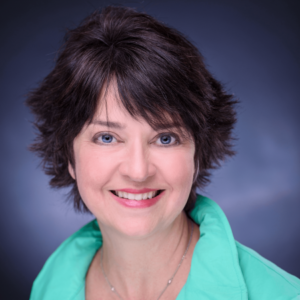
Jane Alexander
President & CEO, Community Foundation for Mississippi
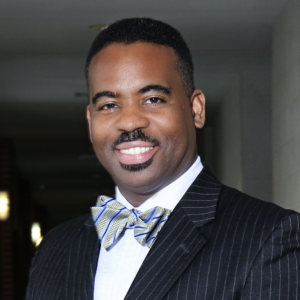
Dr. Robert Blaine
Director, NLC’s Institute for Youth, Education and Families
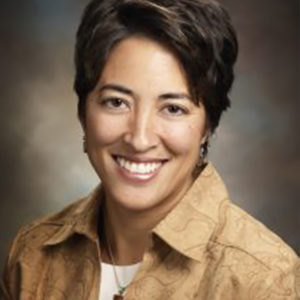
Paula Sammons
Senior Program Officer, W.K. Kellogg Foundation
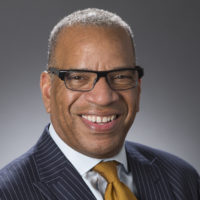
Scot Spencer
Associate Director, Local Policy, The Annie E. Casey Foundation (moderator)
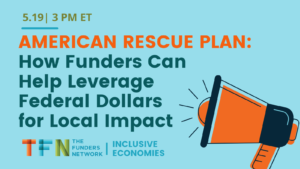
About TFN’s Inclusive Economies
TFN’s Inclusive Economies working group brings place-based funders and related partners from across the sector together to build working relationships, advancing understanding of practices and policies that lead to inclusive prosperity and taking joint action that drives the field forward. We apply a three-part focus — race, place and prosperity — to economic growth and development. A particular goal is connecting people and neighborhoods of color to employment and wealth-building opportunities through investment, systems change, and policy reform.For more information, please contact Hazel Paguaga at hazel@fundersnetwork.org.
"Des Moines Teachers Begin to Get Vaccine" by Phil Roeder is licensed under CC BY
"Des Moines Teachers Begin to Get Vaccine" by Phil Roeder is licensed under CC BY
Cleveland Fed's Policy Summit 2021 will focus on economic resilience & equity
BY TFN STAFF
Policy Summit 2021: Pathways to Economic Resilience in Our Communities, organized by the Federal Reserve Bank of Cleveland, will focus on economic resilience and equity and how they play out in communities of all sizes and compositions. The event, which takes place June 23-25, will highlight the policies and practices that support or hinder people in our most vulnerable communities from being able to prepare for, adapt to, and respond to shocks and stresses.
The effects of COVID-19 and racial injustice will likely be front and center, across a range of topic areas, including but not limited to, small business, workforce, and housing. Check out the agenda for #PolicySummit2021 here.
Pat Smith, president and CEO of The Funders Network, will moderate two sessions at #PolicySummit2021:
Opening Keynote
Economic Resilience: What It Is, What It Is Not, and Why We Must Prioritize It Immediately
Description: “As we move through a pandemic that has wrought havoc on our communities, we find there are many facets to rebuilding: reinvigorating local and regional economies, strengthening neighborhoods by adding quality and affordable housing, supporting small businesses, and providing career pathways for our current and future workforce. This session defines economic resilience, highlights its importance in post-COVID-19 times, and provides ways communities can work toward achieving this goal.”
Speaker:
Otis Rolley, Senior Vice President, The Rockefeller Foundation
Plenary 1
Common Ground in Urban and Rural America: What Has Undermined—and What Can Build—Economic Resilience
Description: “Economic resilience is needed, in both urban and rural communities, now more than ever. In this session, speakers share stories and insights about the geographic and racial exclusion that has undermined the economic health of these two populations essential to the success of our nation. The discussion will also identify strategies and interventions both populations can use to build economic resilience.”
Speakers:
Caitlin Cain, Vice President and Director, Rural LISC
Andre M. Perry, Senior Fellow, The Brookings Institution
Otis Rolley, Senior Vice President, The Rockefeller Foundation
We hope you join us for three days of actionable, resource-rich presentations and conversations about building the economic resilience of our communities. Register for this free and virtual event here.
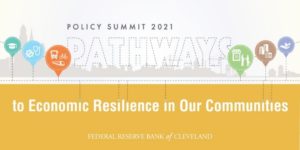
Photo by 5540867 is licensed under CC BY-NC-SA
Investing at the Frontlines of Climate Change: New funder toolkit focuses on climate, health and equity
BY TFN STAFF
The Funders Network (TFN) is thrilled to share a new funder toolkit — focused on climate, health and equity — that aims to help accelerate investments, advance strategy and expand partnerships.
As the impacts of climate change accelerate in communities across the country, funders in every sector face immense needs for investment — especially in communities that are disproportionately impacted. The challenges are profound. But so is a historic opportunity to embed a culture of health, eliminate longstanding inequities, improve the environment, and reshape our communities around the needs of people.
Exciting efforts are emerging across the country. But meeting this moment will require philanthropy to work ambitiously, strategically, at scale and across sectors.
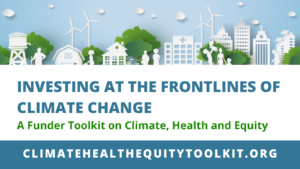
To support this, eight philanthropy-serving organizations worked together to create Investing at the Frontlines: A Funder Toolkit on Climate, Health, and Equity. The aim is to help philanthropy accelerate investments, advance strategy and expand cross-cutting partnerships, especially by supporting highly impacted communities and populations in their own solutions-focused work.
Ready to Get Started?
Whether getting started in this space or ramping up existing efforts, funders can use the toolkit to:
- Gain an overview of a large and interconnected landscape
- See how leading funders, NGOs, and government agencies are working on the frontlines of climate change
- Connect to funding partners or potential grantees
- Scan resources by state, issue focus, or impacted community
- Search for individual funders, NGOs, major funder hubs, and active nonprofit coalitions in relevant areas
- Suggest updates to include additional work
Partner Organizations
TFN is proud to be among the eight philanthropy-serving organizations that worked together to produce Investing at the Frontlines of Climate Change: A Funder Toolkit on Climate, Health, and Equity:
Climate and Energy Funders Group (CEFG)
Environmental Grantmakers Association (EGA)
Health & Environmental Funders Network (HEFN
Sustainable Agriculture and Food Systems Funders (SAFSF)
What will we learn and share at Intermountain West Funders Network's 2021 Virtual Convening?
BY TFN STAFF
Our Intermountain West Funders Network 2021 Virtual Convening kicks off in just under two weeks!
What will be learning during our time together?
Our IMWFN 2021 Virtual Convening Planning Committee has helped craft peer-driven learning agenda that will guide our time together May 12 and 13.
Join as we explore how Intermountain West funders are engaging on critical issues including racial equity, climate and water management, inclusive economies, and Indigenous communities.
We are looking forward to learning together about promising funder practices and new ways of thinking about the unprecedented challenges facing communities in the Intermountain West.
Agenda Highlights
View and download the full #IMWFN2021 Agenda here.
We'll open our virtual gathering at noon May 12 with a chance to hear from Tim Stevens of The Kendeda Fund, chair of IMWFN, as well as Pat Smith, president and CEO of The Funders Network. We'll also feature a short video by filmmaker Pita Juarez of Chispa, an arm of the League of Conservation Voters, made especially for our virtual gathering.
In addition to peer-to-peer funder exchanges and facilitated conversations, we are thrilled to welcome a diverse and thought-provoking lineup of sessions, including:
Getting Centered: Racial Equity at the Heart of the Matter, a conversation with Melanie Mitros of Vitalyst Health Foundation and Dion Cartwright, TFN's director of equitable initiatives & leadership development and head of our amazing PLACES Fellowship. (Melanie is a PLACES Alum as well!)
Gaining Perspective: Views on the Mountain West from 30,000 Feet with Ben Alexander of Resources Legacy Fund, Raymond Foxworth of First Nations Development Institute, Jill Ozarski of the Walton Family Foundation, and moderated by Paula Randolph of the Babbitt Center for Land & Water Policy at the Lincoln Institute of Land Policy.
Just Transition to a Circular Economy with Alicia Marseille of Arizona State University's Rob and Melani Walton Sustainability Solutions Service, Whitney Johnson of the Gates Family Foundation and Colorado Employee Ownership Commission, and moderated by Jessica Gonzalez LISC Phoenix.
Schedule
Day 1: Wednesday, May 12 | Noon MT – 3:30 p.m. MT
Day 2: Thursday, May 13 |Noon MT – 2:30 p.m. MT
Who Should Attend
Registration is open to donors, staff, directors, trustees of public and private foundations, corporate grantmakers and government funders throughout the Intermountain West and elsewhere. We welcome funders, wherever they are in the continuum of learning, to engage with us in this work as we seek to create a shared learning space for strategic conversations about where philanthropic resources can have the greatest impact.
Register now!
About IMWFN
The Funders Network’s Intermountain West Funders Network allows funders to grow relationships, deepen knowledge, explore unique endeavors and share promising practices. While funders in the network embed a variety of lenses into their work, their key focus remains on ensuring that communities in the Intermountain West are equitable, sustainable and prosperous.
"Tucson Sunrise" by docoverachiever is licensed under CC BY
Chauvin Verdict: Responses from the sector
BY TFN STAFF
"We cannot unsee what we have seen. Now that the bar of accountability has been set, we can—and we must—choose to move forward by continuing to act in justice and to address inequities in our systems." - Minneapolis Foundation's statement in response to the Derick Chauvin verdict.
On Tuesday, a Minneapolis jury found former officer Derick Chauvin guilty in the murder of George Floyd, a verdict that came nearly a year after Floyd's death shocked the world and sparked a national reckoning on race and justice.
Here is a round-up of responses from leaders in philanthropy and others. If you would like to share a statement from your organization, please contact TFN's Director of Communications Tere Figueras Negrete at tere@fundersnetwork.org.
TFN Statement
Our Work Continues: Read a statement from TFN President and CEO Pat Smith in response to Tuesday's verdict.
Philanthropy Responds
California Community Foundation
The California Wellness Foundation
Grantmakers Concerned with Immigrants and Refugees
The Kresge Foundation President and CEO Rip Rapson
McKnight Foundation President Tonya Allen
Missouri Foundation for Health
National Committee for Responsive Philanthropy
Partnership for Southern Equity
RWJF President and CEO Richard Besser
San Francisco Foundation CEO Fred Blackwell
Silicon Valley Community Foundation CEO Nicole Taylor
Surdna Foundation President Don Chen
"George Floyd" by chaddavis.photography is licensed under CC BY-SA
Our Work Continues: Statement from TFN's Pat Smith on the Chauvin verdict
BY PAT SMITH
Today, I’m holding two things in my heart.
The first is tremendous relief that a jury believed what our eyes knew from the start: That George Floyd was the victim of a heinous murder at the hands of a police officer.
The second is knowledge that this is a too-rare rebuke of police misconduct in a country where nearly 1,000 people die at the hands of law enforcement each year, with case after case of officers eluding justice after killing a Black person.
I hope that the verdict brings the Floyd family some measure of peace. And I will forever be filled with deep awe and gratitude for the countless people who took to the streets over the past year, invoking his name as a call to action and igniting a national reckoning on race.
But even though the trial is over, nothing is really over.
There is still so much more work to be done. We need to radically re-imagine our approach to law enforcement and to truly keep our communities safe. We have to dismantle racist systems and policies that create barriers to opportunities and cut lives short. We have to not only ensure that Black and brown bodies are physically safe, but that their voices — as well as those of all communities of color — are heard and their ballots counted.
Since testimony in the trial began on March 29, at least 64 people have died at the hands of law enforcement nationwide, with Black and Latinx people representing more than half of those killed, according to the New York Times. That includes Daunte Wright, a young Black man killed in Brooklyn Center, just a few miles from where Floyd’s murderer was standing trial in Minneapolis. It includes Adam Toledo, an unarmed 13-year-old boy gunned down in Chicago. That number does not include 16-year-old Ma’Khia Bryant, killed by a police officer in Columbus, Ohio, less than an hour after Derick Chauvin was found guilty.
So much grief. So much work to do.
For those who would like to explore policy recommendations that center equity and compassion, I recommend you start with PolicyLink’s “policing toolkit,” Building Momentum from the Ground Up: A Toolkit for Promoting Justice in Policing.
There has already been great work being done at the grassroots level, in Minneapolis and beyond. We encourage you and your grantmaking organizations to increase support of frontline organizations led by BIPOC members of our communities through general operating grants, and to truly partner with these groups as equals at the decision-making tables in the communities you serve.
This movement that spurred people to take to the streets and the ballot box this past year has, unsurprisingly, sparked pushback.
Here in Florida, home to TFN’s headquarters, a newly enacted law mandates harsh criminal penalties against protestors exercising their First Amendment rights. The law, signed into law by our governor on Monday, was a direct response to protests demanding police accountability and transparency, and seeks to silence and criminalize those who want to see justice for Black lives.
In Georgia, where voters elected their first Black U.S. senator in November, a controversial new voting law has been enacted to make it harder for people of color to vote. Discriminatory changes to voting laws in Arizona, Michigan, and Texas are also being considered.
Last week, more than 60 foundation leaders — including many members of The Funders Network — joined with corporate executives, scholars and others to protest these efforts to restrict voting rights.
Gerrymandering, which is wielded as a tool of voter suppression, is another obstacle to ensuring communities are fairly represented and adequately funded. To learn more about how funders can engage in the 2021-2022 redistricting cycle, and how it presents a “critical opportunity for communities to build power, ensure equitable political representation, and address systemic inequities,” please visit these resources from the Funders’ Committee for Civic Participation.
I also want to lift up the work of Rukia Lumumba, one of our recent TFN annual conference plenary speakers, and her colleagues whose work supports the Movement for Black Lives Electoral Justice Project.
There are so many activists, advocates and allies that have given me strength and inspiration in the 11 months since that video of George Floyd’s death shook the world.
We can’t let this moment slide into history, but continue to meet it head on with passion and purpose.
That means keeping our eyes always open to injustice, and our hearts always open to change.
About the Author
Pat Smith is the President and CEO of The Funders Network (TFN). TFN’s mission is to leverage philanthropy’s unique potential to help create communities and regions that are sustainable, prosperous, healthy and just for all people. TFN is committed to helping funders understand and address racism, economic inequality, and the imbalance of power — while engendering community-driven solutions and amplifying the expertise and experiences of those communities who are least heard. (To learn more about TFN’s foundational and cross-cutting commitment to racial equity, as well as resources for funders, visit our Putting Equity First page.)
Intermountain West Funders Network 2021 Virtual Convening: Agenda update
BY TFN STAFF
Are you an Intermountain West funder hoping to connect with and learn from peers in the region? Are you eager to learn about promising funder practices and new ways of thinking about the unprecedented challenges facing the communities you serve?
Join us May 12-13 for TFN's Intermountain West Funders Network 2021 Virtual Convening as we create a virtual space to translate national efforts, movements and trends influencing work at the intersection of environment, economy and equity.
Our peer-driven learning agenda will explore how are Intermountain West funders are engaging on critical issues such as racial equity, climate justice, conservation, COVID relief and recovery, and inclusive leadership.
We know how important our in-person IMWFN convenings have been over the last decade, providing a unique set of experiences not found in other funder gatherings. And while we would have loved to gather together in Tucson for this event, we've carved out plenty of time to learn from and share with one another while remaining socially distant.
As we hear every year, it’s the IMWFN participants who highlight promising paths fellow funders can take through often rugged terrain. IMWFN allows funders to grow relationships, deepen knowledge, explore unique endeavors and share promising practices specific to the region. While funders in the network embed a variety of lenses into their work, their key focus remains on ensuring that communities in the Intermountain West are equitable, sustainable and prosperous.
Learn more about the #IMWFN2021 agenda and registration here.
Thank You
We thank the IMWFN Planning Committee for helping us pivot to a virtual format:
Jessica Gonzalez, LISC Phoenix
Laia Mitchell, Gates Family Foundation
Melanie Mitros, Vitalyst Health Foundation
Paula Randolph, Babbitt Center for Land & Water Policy (Committee Chair)
"Tucson Sunrise" by docoverachiever is licensed under CC BY
Flash Talks, Federal Policy & Film Sessions: Check out agenda updates for TFN's 2021 Virtual Conference!
BY TFN STAFF
It's not too late to register and join our virtual event exploring the strategies and stories that are creating more equitable, sustainable, and resilient places to live — work that has taken on increased urgency as we face the dual challenges of a global pandemic and structural racism.
Take a look at just some of our featured highlights below, including our Federal Policy Roundtable, Flash Talks, and Learning from Place: Storytelling through Film concurrent sessions.
And please visit our #TFN2021 webpage for more info on registration, sessions and speakers.
Federal Policy Roundtable
Wednesday, March 17 | 3:30 p.m. ET

Join us for a Federal Policy Roundtable to explore the challenges and opportunities around issues such as water equity, climate crisis, economic recovery, mobility and transit justice, and Covid-related impacts.
What have we learned in the first few months of the Biden administration, and what role can funders play in a changed but nonetheless fraught political climate? What can agency senior leaders share about their key priorities?
We’ll delve into if and how racial equity will be embedded and prioritized, and how this work can move ahead in an intersectional, collaborative way within the executive agencies.
Speakers
Christopher Coes, Deputy Assistant Secretary for Transportation Policy, U.S. Department of Transportation
Peggy Bailey, Senior Advisor, U.S. Department of Housing and Urban Development
Radhika Fox, Acting Assistant Administrator, U.S. Environmental Protection Agency Office of Water
Sameera Fazili, Deputy Director, National Economic Council
Don Chen, President, Surdna Foundation (moderator)
Flash Talks
TFN's virtual conference will feature four compelling Flash Talk speakers, who will share their stories and insights. Our #TFN2021 Flash Talk presenters are:
August Creppel, Chief, The United Houma Nation

Monday, March 15 | 2:30 p.m. ET
We are honored to have Chief August Creppel of The United Houma Nation as our first Flash Talk presenter.
The United Houma Nation is composed of proud and independent people who have close ties to the water and land of their ancestors. This Indigenous tribe calls the lands now known as Louisiana home. Their tribal communities rely on interwoven bayous and canals to stay connected and earn a living, but the effects of coastal erosion have made those waterways nonexistent or impassable.
The United Houma Nation is grappling with the unique challenges of preserving and maintaining their way of life when the land is disappearing from underneath their feet.
Tamika L. Butler, Founder & Principal, Tamika L. Butler Consulting

Tuesday, March 16 | 1:30 p.m. ET
As the principal and founder of Tamika L. Butler Consulting, Tamika focuses on shining a light on inequality, inequity, and social justice.
She draws from her wide-ranging and diverse background in law, community organizing and nonprofit leadership to challenge and inspire organizations and individuals to fight those inequities and injustices.
Her work has included serving as executive director of the Los Angeles Neighborhood Land Trust and most recently as both a director of planning and the director of equity and inclusion at Toole Design.
Sunni Patterson, New Orleans Poet

Tuesday, March 16 | 3 p.m. ET
Sunni Patterson combines the heritage of her native New Orleans with an enlightened modern style to create her music and poetry.
She began her career as a full-time high school teacher, and much of her life since has been devoted to serving as a cultural worker and grassroots activist, using art and poetry to encourage dialogue and healing.
She has been a featured performer at many of the nation's premier spoken-word venues, including HBO's Def Poetry and BET’s Lyric Cafe.
(Sunni Patterson is also the subject of our Learning from Place: Artist in Exile film session on Tuesday, March 16 at 3:15 p.m. ET.; scroll down for more details.)
Dr. Denese Shervington, Professor, Psychiatrist & Mental Health Advocate

Denese Shervington, MD, MPH, is a chairperson and professor at Charles R. Drew University of Medicine and Science and the president of the Institute for Women and Ethnic Studies.
She has an intersectional career in public health, clinical, and academic psychiatry.
After Hurricane Katrina, she created a post-disaster emotional recovery and resilience division at the community-based non-profit public health organization that she founded, the Institute of Women and Ethnic Studies.
Her Flash Talk will center healing in our ongoing conversations about collective trauma.
(Dr. Denese Shervington will also facilitate a Critical Conversation on Wednesday, March 17 at 1:15 p.m. ET; scroll down for more details.)
Learning from Place: Storytelling through Film
We have a long tradition at our TFN conferences of lifting up the power of storytelling to transform narratives and drive change.
For our virtual conference, we'll present three concurrent Learning from Place sessions, each featuring a short film (or film clip) and a conversation with funders and filmmakers.
All Learning from Place sessions take place Tuesday, March 16 at 3:15 p.m. ET.
Learning from Place: Hollow Tree

Watch and discuss a segment of Hollow Tree, a feature-length documentary-in-progress about three young women who spend a year exploring the history of the Mississippi River in Louisiana. For the first time, they notice the river’s engineering, stumps of cypress trees, and billowing smokestacks. Their different perspectives weave together a new story about climate change and how they fit into it.
Speakers:
Kira Akerman, Film Director, Hollow Tree
Tanielma Da Costa, Film Protagonist, Hollow Tree
Diane Ives, Fund Advisor, The Kendeda Fund (moderator)
Learning from Place: Artist in Exile

Join us for the short film Artist in Exile, which merges documentary and poetry as it follows poet Sunni Patterson’s return to New Orleans 12 years after Hurricane Katrina. Patterson, who is also presenting a Flash Talk at TFN’s 2021 Virtual Conference, comes from a long line of ancestors who have called New Orleans home for hundreds of years.
Speakers
Sunni Patterson, Poet, Performer
Kiyoko McCrae, Director, Artist in Exile;
Director of Documentary Programming and Filmmaker Labs
New Orleans Film Society
Carmen James Randolph,
Vice President for Programs, Greater New Orleans Foundation
Learning from Place: NONSTOP

We'll share a sneak peek of the short documentary film NONSTOP, which follows the struggles of New Orleans bus operators amid the coronavirus pandemic. The New Orleans Regional Transit Authority is a lifeline for many, with its bus system transporting frontline workers to their jobs, riders to the grocery store, and the sick to their doctors. But while the bus operators continued to fight for proper PPE, hazard pay, and sick leave, the bus remained a breeding ground for COVID-19.
We hope you'll join us for #TFN2021 March 15-17!
New TFN Report! Community Foundations: Drivers of Inclusive and Meaningful Local Change
BY TFN STAFF
How can community foundations help create meaningful change in local communities?
What sorts of partnerships can be modeled effectively?
And what opportunities are there for regional and national funders to advance community change and power-building?
The Funders Network has released Community Foundations: Drivers of Inclusive and Meaningful Local Change, which looks at three community foundation programs and examines how these partnerships and initiatives are helping broaden expertise, grow peer networks, deepen local connections and build community power.
This report, made possible with the support of the S.D. Bechtel, Jr. Foundation, was researched and written by Estolano Advisors and includes interviews with and a survey of participating community foundations and their local partners, program investors, and TFN staff.
The report surfaces key outcomes and lessons learned from TFN’s three community foundation partnership programs:
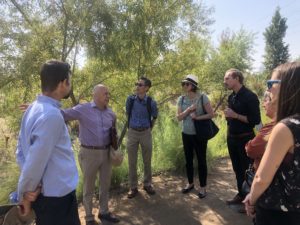
The Community Foundation Water Initiative, launched in 2015, includes five community foundation partners working individually and collectively to advance sustainable water management solutions. Since 2017, Smart Growth California, a TFN initiative, has facilitated efforts to identify and implement high-value collective activity toward achieving water goals. The program, which ended in 2020, was supported by a single funder, the S.D. Bechtel, Jr. Foundation.
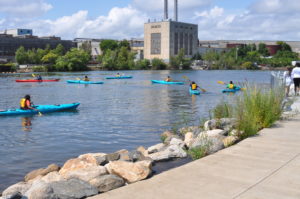
Partners for Places, a matching grant program run jointly by TFN and the Urban Sustainability Directors Network, creates opportunities for cities and counties in the United States and Canada to invest in local projects that make urban areas more prosperous, livable, and vibrant while also fostering long-term relationships between local government sustainability offices, community foundations, and frontline community-led groups. Accepting applications for Round 18 until March 19, Partners for Places has awarded more than $7.5 million leading to more than $16 million in investments. Partners for Places is currently supported by The JPB Foundation, The Kendeda Fund, The Kresge Foundation, New York Community Trust, and the Pisces Foundation.
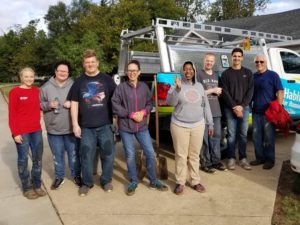
Key Findings & Case Studies
Two key findings emerged while conducting this research:
Community foundations are crucial partners in creating meaningful and sustainable change in local communities.
Regional and national foundations have rich opportunities through these partnership models to engage place-based foundations in building community power and advancing inclusive community change.
Community Foundations: Drivers of Inclusive and Meaningful Local Change also lifts up several case studies that are illustrative of the work supported by these community foundation partnership models. In the report, you’ll learn how:
The Quad Cities Community Foundation, a member of the PPREP learning cohort, has added disaster preparation and recovery as a primary focus area in a region that has grappled with severe flooding and other extreme weather, cultivating relationships with organizations in other sectors, such as local nonprofits, first responder groups, and the media. The foundation also launched a Nonprofit Disaster Capacity Building cohort, based on PPREP, that strengthened 22 local nonprofit’s capacity to withstand emergencies and better serve their communities in the aftermath of local disasters.
The San Francisco Foundation’s participation in the Community Foundation Water Initiative helped it further its mission of advancing racial and economic inclusion while bringing water-related work into their new program areas. This included funding ClimatePlan — a statewide network led at the time by a Black female executive director, who brought a voice and perspective rarely seen in regional planning processes — to develop an action plan to equitably integrate water and land use in the San Francisco region.
The Greater New Orleans Foundation is supporting community-driven climate action planning in New Orleans through two Partners for Places matching grants. The first facilitated the development of the Trust for Public Land’s Climate Smart Cities tool, which aids the city in making location decisions for green, climate resilient infrastructure that helps to address socioeconomic and environmental inequities. The second Partners for Places award helped the City of New Orleans create a climate action strategy that integrated equity into the city’s implementation of its climate action plan.
Read the Report
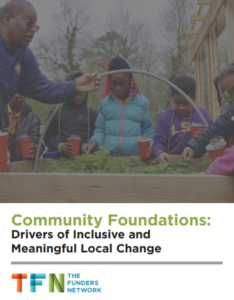
We invite you to download a copy of the Community Foundations: Drivers of Inclusive and Meaningful Local Change report and executive summary; the report is also available in a tablet- and mobile-friendly version via the Issuu publishing platform.
Download PDF: Community Foundations: Drivers of Inclusive and Meaningful Local Change
Download PDF: Community Foundations: Drivers of Inclusive and Meaningful Local Change (Executive Summary)
Web Friendly Version: Community Foundations: Drivers of Inclusive and Meaningful Local Change via Issuu
Thank you
TFN would like to thank the S.D. Bechtel, Jr. Foundation for its support, the team at Estolano Advisors for its hard work creating this report, and the funders, partners and local advocates who took the time to share their experiences and insights. We'd also like to thank the community, regional and national funders across our membership network for their commitment to creating communities that are equitable, sustainable and prosperous.
Learn More About Our Work
Visit the TFN Publications section on this website to see more publications from The Funders Network.
Shop Here! Virtual Market features NOLA artists and entrepreneurs as part of #TFN2021
BY TFN STAFF
While we had originally hoped to hold our 2021 conference in New Orleans, we want to nonetheless celebrate the people, cuisine and culture of this beautiful and resilient city.
We also hope to minimize the economic impact of our decision to go virtual with an opportunity to support local New Orleans vendors and entrepreneurs, many of whom have been hard hit by the economic impacts and social disruptions caused by the ongoing coronavirus pandemic.
The Shop Here! Virtual Market offers the opportunity to order directly from NOLA-based vendors, artisans, and social enterprises as a way to support these local vendors.
TFN's 2021 Virtual Conference: Rise Together takes place March 15-17. But you don't have to wait for our virtual conference to order something cool for yourself or someone you care about: The market is already open for business on our #TFN2021 webpage.
And you don't have to be registered for TFN's virtual conference to make purchases and support these businesses. (Although we do hope you'll register if you haven't; Early Bird rates end this Friday!)
TFN worked with Berto Horne and Ayanna Carrington of the Atlanta-based The Village Market, which seeks to connect Black-owned businesses to engaged consumers, impactful resources, and investors. Berto and Ayanna helped curate this virtual market with an emphasis on Black-owned businesses that connect to the vibrant culture and history of New Orleans and its surrounding region.
The links in our Shop Here! Virtual Market will take you directly to those vendors' sites. TFN did not charge any fees to vendors for participating, and all transactions are conducted directly with the vendors featured in this virtual market.
We'd like to offer a special thanks to The Rockefeller Foundation for its support as a presenting sponsor of the Shop Here! Virtual Market.
Learn more about our conference, including speakers, sessions and other highlights here.
Shop Here! Virtual Market

Below are just some of the New Orleans-based businesses you can find in the Shop Here! Virtual Market. Please visit the market to find links to these vendors and others.
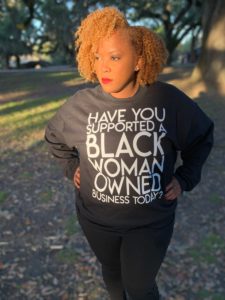
Fankara Fans offers a breath of fresh air in the form of collapsible, handmade fans in vibrant colors (like those pictured above.) They also offer a variety of tees and bags that asks the question, "Have you supported a Black woman owned business today?"

Maison Bertrand, founded in 1931 as the Monogram Coffee Company in Shreveport, La., offers iconic chicory coffee and other celebrations of Louisiana tradition and culture, including handmade pralines and apple cider caramels.

Meet Me At The Bar connects people over cocktails through curated experiences and products, including both in-person and virtual events. The company was founded by college friends Chanté McDonald and Ciara Coleman. (Fun fact: Ciara is a 2018 TFN PLACES alum!)

A self-confessed extrovert and hypochondriac, Taylor Simone found herself feeling idle and alone during quarantine closures, so she turned her jewelry-making hobby in to a business. Joy Journey offers handmade polymer clay earrings, including custom options.

The Rustic Shoebox was founded by former IT professional Chatoya Connor, who swapped a career in the corporate world for a new one selling fiercely fashionable shoes, handbags and other accessories.
Conference Highlights
TFN’s 2021 Virtual Conference: Rise Together will encourage funders to explore the strategies and stories that are creating more equitable, sustainable, and resilient places to live — work that has taken on increased urgency as we face the dual challenges of a global pandemic and structural racism.
We’ve designed sessions that are intersectional, cross-cutting and grounded in racial equity and speak to activism, collaboration and movement building.
Please check out our TFN 2021 Virtual Conference: Rise Together webpage for more updates and conference highlights, including #TFN2021 Critical Conversations, Flash Talks, a Cook Here! Funder Social Hour and other opportunities to learn, share and connect.


